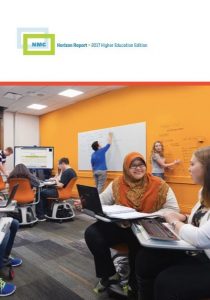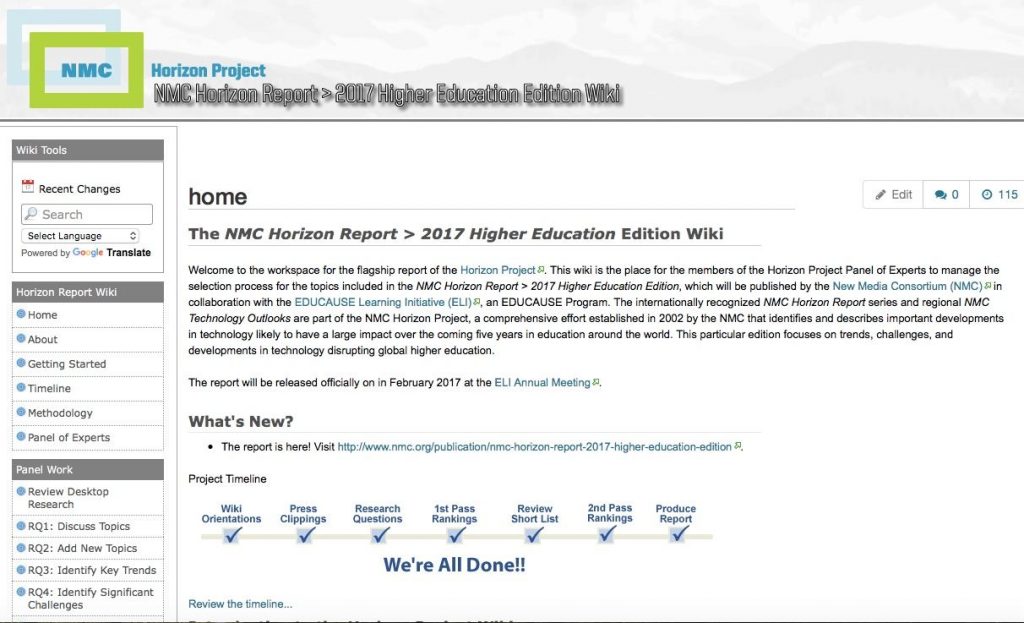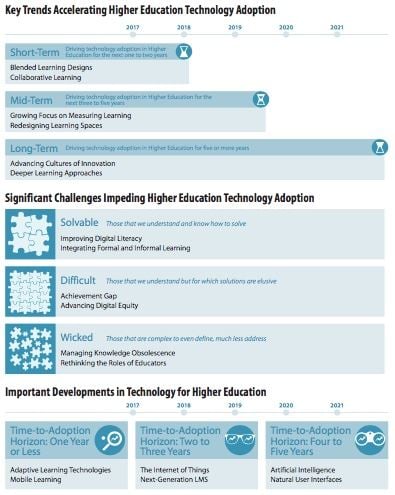 I’ve previously posted about the annual NMC Horizon Report, but hadn’t paid it close attention for a while. This year’s report came out earlier in the year, and I’ve just perused it – backwards, actually, as the first thing I did was look at the list of contributors to check how many Australians were consulted. Reassuringly there are four, though strictly speaking Gilly Salmon probably counts as British (unless she’s taken up citizenship!).
I’ve previously posted about the annual NMC Horizon Report, but hadn’t paid it close attention for a while. This year’s report came out earlier in the year, and I’ve just perused it – backwards, actually, as the first thing I did was look at the list of contributors to check how many Australians were consulted. Reassuringly there are four, though strictly speaking Gilly Salmon probably counts as British (unless she’s taken up citizenship!).
This subsequently drew me to the section on Methodology, wondering how the report organisers managed to get a large group of international collaborators to meaningfully contribute. Essentially, the report:
draws on the expertise of an international expert panel that first considers a broad set of trends, challenges, and developments in technology, and then explores each of them in progressively more detail, reducing the set until the final listing of topics is selected. This process takes place online, where it is captured in the NMC Horizon Project wiki. The wiki is intended to be a completely transparent window into the work of the project, one that not only provides a real-time view of the work as it happens, but also contains the entire record of the process for each of the various editions published since 2006.
 Note the phrase ‘transparent window’ with reference to the wiki. Yes, you can browse the entire deliberations of the expert panels as they gather the information that forms the backbone of the report. This provides us with a fascinating insight into the process, as well as the chance to locate interesting examples of applications of technologies, not all of which appear in the final report. The most interesting bits are found under the links ‘RQ1: Discuss Topics’ and ‘RQ2: Add New Topics’ in the left hand column.
Note the phrase ‘transparent window’ with reference to the wiki. Yes, you can browse the entire deliberations of the expert panels as they gather the information that forms the backbone of the report. This provides us with a fascinating insight into the process, as well as the chance to locate interesting examples of applications of technologies, not all of which appear in the final report. The most interesting bits are found under the links ‘RQ1: Discuss Topics’ and ‘RQ2: Add New Topics’ in the left hand column.
 Under ‘Discuss Topics’ you’ll initially find the full list of areas addressed by the panels. There’s plenty of them (37), so just choose your favourites and see what our colleagues had to say about them.
Under ‘Discuss Topics’ you’ll initially find the full list of areas addressed by the panels. There’s plenty of them (37), so just choose your favourites and see what our colleagues had to say about them.
For each topic, a description of the technology was provided, and four questions were posed:
How might this technology be relevant to the educational sector you know best?
What themes are missing from the above description that you think are important?
What do you see as the potential impact of this technology on higher education?
Do you have or know of a project working in this area?
Some have extensive discussions (e.g. Internet of Things), while others are pretty sparse (e.g. Natural User Interfaces). I haven’t looked at them all, but the first one (Drones), for example, includes examples from Mexico, Germany, USA and the UK.
‘Add New Topics’ reveals the special interests of some panel members, including bioauthentication, chatbots, ePortfolios, gamification, and even ‘low code citizen development platforms’. If any of these excite you, see what our experts have to say!
Off you go, have a browse. And if you’re seeking a nice little research project, an analysis of the report’s wiki workings could be both great fun and insightful.
 Finally, though, you should of course read the report itself, nicely summarised in this graphic. Agree or disagree, there’s plenty of food for thought.
Finally, though, you should of course read the report itself, nicely summarised in this graphic. Agree or disagree, there’s plenty of food for thought.